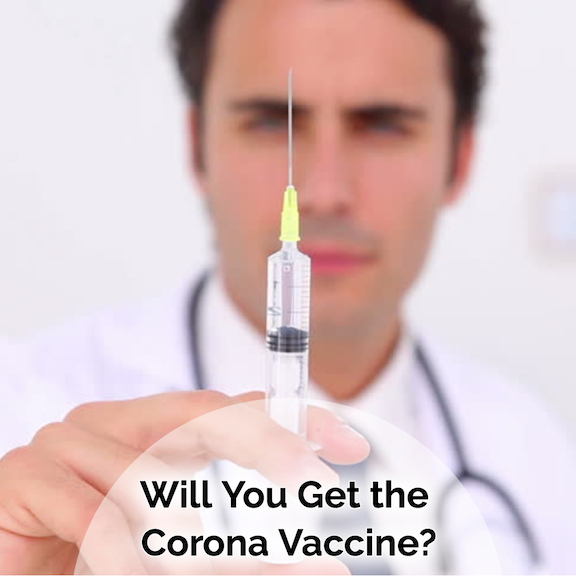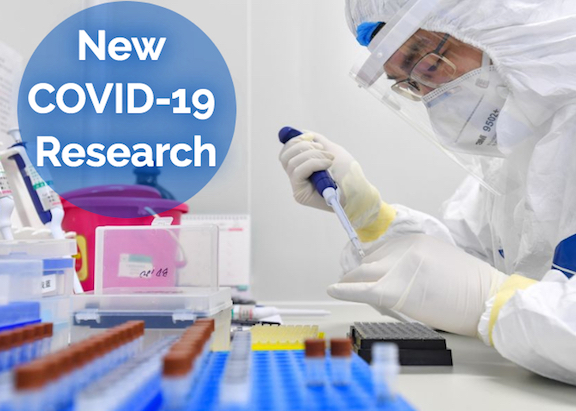Acupuncturists across the country are slowly starting to see patients again, and patients may be discussing COVID-19 or asking questions about its potential vaccine. In recent weeks, the question of “When will there be a vaccine? Will it be safe? Are you getting the vaccine?” has been on everyone’s lips. There is a lot of talk amongst the general public making plans around the potential arrival of the COVID-19 vaccine, especially in consideration of family reunions, weddings, etc. Conversely, there are many who worry about the speed with which the vaccine is being developed, and are hesitant at jumping on board when the COVID-19 vaccine eventually comes into fruition. As a healthcare professional, it is important for the acupuncture community to stay abreast of the information surrounding the eventual COVID-19 vaccine. In today’s article, we will take a look at some current and up to date information on where we are in the race for a vaccine, and some information for patients should they inquire.
Vaccines
A vaccine forces the immune system to make antibodies to fight off a disease so that next time you come into contact with the germs your immune system knows what to do. Essentially, the vaccine gives you immunity so that you don’t become infected with the disease. Furthermore, the effects of that disease would be much milder with the vaccine, than without. In the case of COVID-19, there are more than 160 potential vaccines under study to date, and experts are hoping to have a viable vaccine ready by the end of 2020. This is a very optimistic goal as vaccines can take years to develop under a normal course of events and testing.
Standard vaccine development:
- Preclinical Testing – scientists give the potential vaccine to animals such as monkeys or mice to see if it produces an immune system response.
- Phase 1 – the vaccine is given to a small group of people testing safety and dose. It will also confirm that it stimulates the immune system in humans.
- Phase 2 – the vaccine is given to hundreds of people of different age groups to see if it affects these age groups differently. This further tests the vaccines safety and efficiency at stimulating the immune system.
- Phase 3 – the vaccine is given to thousands of people compared to a group receiving placebo. Scientists wait to see how many become infected compared with the placebo group, and this is the phase that can determine if the vaccine is efficient in protecting against COVID-19.
- Approval – Vaccine regulators review the trial results and determine whether to approve the vaccine for use or not. For COVID-19, being that it is a pandemic, the vaccine may receive emergency use authorization before getting the formal approval.
Many vaccines that are currently under development for COVID-19 have combined these phases to accelerate vaccine development. For instance, there are some groups in the race to develop a coronavirus vaccine that are in Phase 1 or Phase 2 trials, meaning they are testing for the first time on hundreds of people.
As of now, the U.S. government instituted Operation Warp Speed which has selected five vaccine groups to receive a great deal of federal funding and support before proof that the vaccine has protective capabilities. However, many scientists are stating that the federal government should be prepared for things to slow down as vaccine developers get further along in testing. Development of a vaccine doesn’t always go as planned, and there tends to be many bumps along the road of the production process. An official from the Trump administration said in a conference call with reporters on June 16th that they couldn’t guarantee that a vaccine will be ready by the end of the year.
Types of Vaccines
With the COVID-19 cases worldwide at more than 6.4 million and climbing, researchers and scientists are pushing for a vaccine and/or treatment to slow the spread of the virus. Each vaccine group within Operation Warp Speed are using different types of vaccines. Some are proven with current vaccines on the market already, and some are new and potentially promising.
Vaccine types:
- Gene-Based Vaccine – Unproven, but easy and fast to make. No approved vaccines for humans using this method. – These vaccines are definitely the underdog of the bunch. The vaccine groups Moderna and Pfizer have a gene-based vaccine being tested. This type of vaccine is different because instead of delivering dead or inactive bits of virus to the immune system, gene-based vaccines introduce a gene that encodes protein on the outside of the virus called spike protein. This vaccine is made up of genetic material, mRNA or DNA, which encodes instructions for making the protein (spike protein) found in coronavirus. When the mRNA or DNA enters the body’s cells, they read the instructions and produce copies of the protein for the immune system to fight off. If the immune system is trained to recognize and block the spike protein that coronavirus needs to break down cells and replicate, the virus can’t attack or continue to spread. In short, the patient makes their own vaccine.
- Pros – These vaccines are easy to make once the genetic sequence they target is discovered. Additionally, they are easy to manufacture. If proven to work, companies could quickly produce millions of doses.
- Cons – These vaccines are still largely experimental for humans despite being simple, fast, and having been worked on for decades. There has never been a gene-based vaccine approved by the FDA, and if it makes it to the end, it will be the first.
- Pros – These vaccines are easy to make once the genetic sequence they target is discovered. Additionally, they are easy to manufacture. If proven to work, companies could quickly produce millions of doses.
- Inactivated Virus – Proven, but hard to manufacture. Approved for the Polio and Flu vaccines. – These vaccines are ones that we are more aware of when it comes to vaccines. Scientists kill a virus with heat or radiation rendering it harmless but recognizable by the immune system.
- Pros – These types of vaccines have been around for several decades, and well understood by modern scientists. The standard vaccine so to speak.
- Cons – These vaccines are hard to make. Although manufacturers have experience with them, they have to grow and heat massive amounts of the virus in question making it a slow process. Additionally, the immunity for these vaccines tends to fade, creating the need for booster shots in addition to coming with side effects like mild fevers or muscle soreness.
- Pros – These types of vaccines have been around for several decades, and well understood by modern scientists. The standard vaccine so to speak.
- Adenovirus Vector Vaccines – Good at provoking an immune system response but still experimental. No approved vaccines for humans that use this method. – These work somewhat similarly to the gene-based vaccine, except it contains a live, weakened, virus. In order to speed up the process, scientists are not attempting to weaken the entire coronavirus, but instead inserting sections of the coronavirus gene into weakened live versions of other viruses called adenoviruses. These are broken down to an extremely weakened state so that they are harmless. The engineered adenovirus puts a piece of genetic material from COVID-19 into cells, and cells create copies of the spike protein. The adenovirus is activating the immune system.
- Pros – Since it is a weakened, live virus, the immune system has a strong response to it giving longer, more robust, and durable immunity. Meaning, one shot would be enough.
- Cons – Just as with gene-based vaccines, although we regularly use live virus vaccines, these platforms are still experimental and has not been used for infectious diseases. There is also concern that people may be immune to the adenovirus that’s bringing the coronavirus into the body. Although the adenoviruses being used are fairly uncommon, some people may have encountered them before, and the vaccine wouldn’t work for them.
- Pros – Since it is a weakened, live virus, the immune system has a strong response to it giving longer, more robust, and durable immunity. Meaning, one shot would be enough.
- Protein Subunit Vaccines – A well-known platform but hard to scale. Approved for HPV vaccine. – These vaccines deliver the specific part of the virus that we need to build antibodies against. This vaccine contains copies of the spike protein and something to stimulate the immune system. This is the same approach that scientists are using in an effort to create a universal flu vaccine.
- Pros – Scientists are familiar with this type of vaccine, and it has worked well previously for other types of disease. Also, since it only contains a piece of the virus, there are less likely to be side effects from it.
- Cons – The fact that these vaccines only contain a piece of the virus could also work against its possibility to work. With only a piece of the virus, it sometimes cannot push the body to generate an immune response, and people often need multiple shots to build immunity to the disease.
- Pros – Scientists are familiar with this type of vaccine, and it has worked well previously for other types of disease. Also, since it only contains a piece of the virus, there are less likely to be side effects from it.
Each type of vaccine could potentially show promise, but it needs to meet specific factors. From easy to make and manufacture, to being effective and safe. This is what the vaccine groups are currently racing to do to slow the spread of COVID-19.
Should You Get the Vaccine?

While acupuncture doesn’t necessarily directly correlate with the vaccine development, many of our patients look to their healthcare providers for sound advice and resources regarding their health. With the number of cases of COVID-19 still climbing daily, especially with the reopening and relaxation of stay-at-home orders throughout the country & worldwide, it is imperative that a solution is brought to light. As acupuncturists, it is important to do your due diligence when looking into whether the COVID-19 vaccine will be right for you.
As we said above, Operation Warp Speed has selected five vaccine groups to receive funding in the development of the coronavirus vaccine. Three of these five are due to go into Phase 3 testing as early as July. They are Moderna, University of Oxford and AstraZeneca, and Pfizer and BioNTech. The other groups are Johnson & Johnson, and Merck. You can find more, and stay up to date on the development of the COVID-19 vaccine here.
We must stay informed, and diligent as we navigate new information about COVID-19 and an inevitable vaccine.

